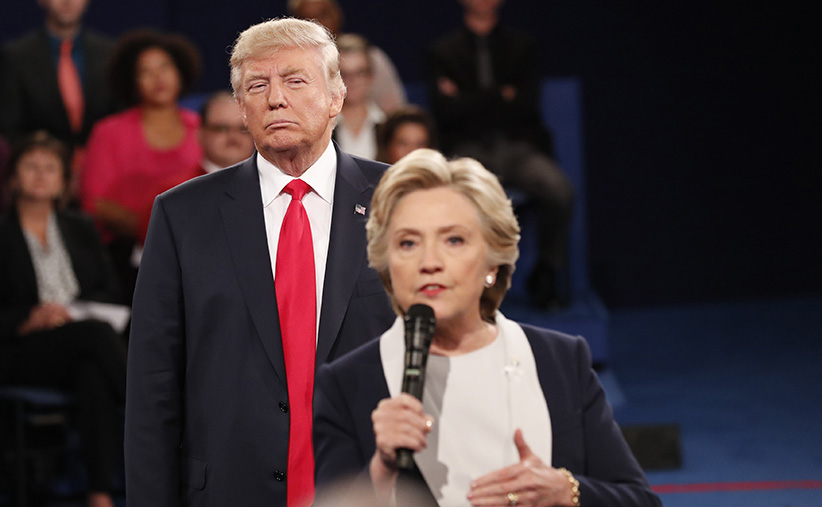Donald Trump and Hillary Clinton are clueless on Syria
It was all too clear in the last debate. Neither candidate has any idea what to do about the world’s most dangerous war.
Share

It took all of 10 minutes during last Sunday’s U.S. Presidential debate for the two candidates vying to become the most powerful elected leader in the world to admit they have no idea what to do about the world’s most dangerous war.
It was surprising, considering that in the days leading up to and just after the verbal slugfest that was the first debate, Syria had gone through some of the worst violence yet seen in its five-and-a-half year conflict. A ceasefire brokered by the U.S. and Russia had collapsed, Aleppo was burning under a relentless Russian bombing campaign, and Turkey had defied its NATO allies to expand its incursion into Syria’s north.
By the time the second debate rolled around, it seemed obvious that a substantive discussion was needed on how the next U.S. president would deal with a war that is now threatening the basic foundations of the post-Cold War world order.
Instead, what we got was more of the same: finger pointing, blame gaming, and digressions into who is the baddest cat of them all.
“I stood up to Russia; I’ve taken on Putin and others and I would do that as president,” Hillary Clinton puffed.
“She talks tough. She talks really tough against Putin and against Assad,” Donald Trump retorted, sarcastically.
Between the hisses, the audience was subjected to an incoherent stream of half-truths and quarter-policies. For Clinton, it was all about Russia. “I want to emphasize that what is at stake here is the ambitions and aggressiveness of Russia,” she said. “Russia has decided it is all in in Syria.”
For Trump, it was all about Clinton and her cohorts in the White House. “Syria is Russia, and it’s Iran who she made strong, and Kerry and Obama made into a powerful nation and a rich nation, very quickly, very, very quickly,” he said.
Clinton talked about a no-fly zone and humanitarian safe zones, both of which have been thoroughly debunked as strategic disasters by military experts, including Joseph Dunford, chairman of the U.S. Joint Chiefs of Staff who pointed out last month that clearing Syria’s skies “would require us to go to war against Syria and Russia.”
Trump kept pivoting to his favourite topic, Islamic State, which he inexplicably blamed for the Syrian crisis, reversing the well-established causal relationship between war and the terrorist groups war generates.
Neither of them talked about Saudi Arabia, Qatar, or Turkey, countries that continue to support radical Salafi-jihadist groups in the anti-regime coalition, or the youth activists from groups like Raqqa Is Being Slaughtered Silently and others, who struggle against sectarianism and religious intolerance and are the future of Syria but have received almost no support from western nations.
In fact, on balance, Trump’s policy on Syria does not look that much different than Clinton’s. According to Indiana governor and Trump vice-presidential running mate Mike Pence, the difference lies primarily in Trump’s focus on “destroying ISIS in Syria and not regime change.”
There is nothing new in this. President Barack Obama has been a strong proponent of focusing the U.S. military’s attention on Islamic State, which he considers a bigger threat to American interests than the Bashar al-Assad regime. His strategy—to squeeze Islamic State territory using local militias backed by western airpower—is working. Neither Trump nor Clinton indicated they would substantially change course.
On Syria, Secretary of State John Kerry publicly acknowledged last year that the U.S. was not after regime change, but rather felt Syrian President Assad had lost all legitimacy to rule. Trump seemed to agree, admitting that he doesn’t “like Assad at all.”
Which leaves us, well, nowhere, at least nowhere closer to understanding how either of the candidates would be any different from what we have today. Clinton rightly acknowledged that there would be no solution to Syria without finding a way to “leverage” Russia. Trump correctly pointed out that Russia is in too good of a position right now to be leveraged.
Trump nailed the current U.S. administration for not knowing which groups to back in the roiling stew of Syrian rebel groups fighting the regime. Clinton turned the tables by pointing out there is really no other choice: short of deploying U.S. ground troops, which neither candidate supports, finding reliable local partners is the only option.
In the end, there was only one thing that was clear: both candidates seemed to know what’s going wrong in Syria; neither could lay out a plan for what to do about it.